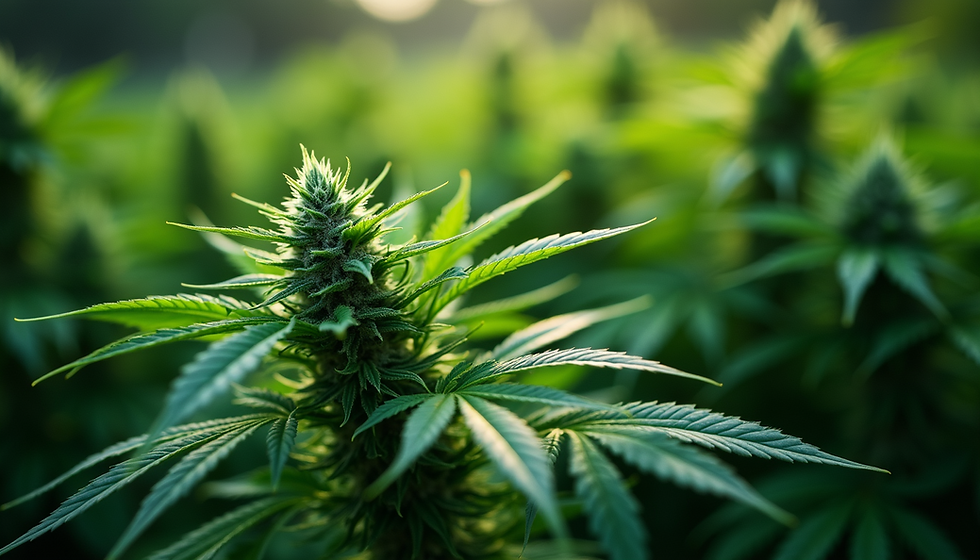The Green Screen: How Cannabis is Portrayed in Media and Entertainment
- Mar 30, 2024
- 3 min read

The portrayal of cannabis in media and entertainment has undergone a significant transformation over the past few decades. From its countercultural roots to its current mainstream acceptance, the depiction of cannabis has mirrored and sometimes influenced societal attitudes and policies. This article explores the evolution of cannabis representation in television, movies, and music, highlighting the shifts in perception and their broader implications.
From Counterculture to Comedy
In the 1960s and 1970s, cannabis was closely associated with the counterculture movement, often portrayed in media as a symbol of rebellion against the mainstream. Films like "Easy Rider" and music from artists like Bob Marley used cannabis as a motif to represent freedom, resistance, and a break from societal norms. However, these representations also carried a stigma, reinforcing stereotypes of cannabis users as "stoners" or societal outcasts.
As we moved into the 1980s and 1990s, cannabis began to find its place in the comedy genre. Movies like "Cheech & Chong's Up in Smoke" and "Half Baked" presented cannabis use in a humorous light, focusing on the comedic antics of its protagonists. While these portrayals helped normalize cannabis to some extent, they also perpetuated the "stoner" stereotype, often overshadowing the more nuanced realities of cannabis use.
Dramas, Documentaries, and a Shift in Narrative
The new millennium brought a more diverse portrayal of cannabis, with dramas and documentaries beginning to explore its medicinal uses and the social justice issues surrounding its prohibition. Television series like "Weeds" and "Breaking Bad" introduced complex characters and narratives that included cannabis as a central theme, reflecting its growing presence in American society.
Documentaries such as "The Union: The Business Behind Getting High" and "Weed the People" presented factual insights into the cannabis industry, the medicinal benefits of cannabis, and the consequences of its criminalization. These portrayals contributed to a more informed and balanced view of cannabis, highlighting its potential beyond recreational use.
Music: Reflecting and Shaping Attitudes
Music has always been a powerful medium for expressing cultural attitudes toward cannabis. Reggae music, with artists like Bob Marley and Peter Tosh, celebrated cannabis as a spiritual and medicinal herb, influencing global perceptions. In hip-hop and rap, cannabis has been both a symbol of the high life and a commentary on the war on drugs, with artists like Snoop Dogg and Wiz Khalifa openly advocating for its legalization and normalization.
Mainstream Acceptance and Reality TV
The legalization movement has further shifted cannabis portrayal towards mainstream acceptance. Reality TV shows like "Cooking on High" and "Weediquette" present cannabis in everyday contexts, from cooking shows to journalistic inquiries, normalizing its use among a broader audience. This mainstream acceptance is also reflected in the casual depiction of cannabis in popular TV shows and movies, where it's often shown as part of regular social interactions, devoid of the earlier stigmatization.
Impact on Public Opinion and Policy
The evolving portrayal of cannabis in media and entertainment has played a significant role in shaping public opinion and influencing policy. As representations have moved from stigmatized to normalized, public attitudes have shifted towards greater acceptance, contributing to the legalization movement in various parts of the world. The media's role in humanizing cannabis use and users has been crucial in challenging stereotypes and advocating for policy changes.
Conclusion
The journey of cannabis through the lens of media and entertainment reflects broader societal shifts from marginalization to acceptance. As the narrative continues to evolve, it's essential to recognize the power of these portrayals in shaping perceptions, informing public debate, and influencing policy decisions surrounding cannabis.
Disclaimer
This article is intended for informational purposes only and does not endorse or promote the use of illegal substances. The portrayal of cannabis in media and entertainment varies widely and may not always accurately reflect the complexities of cannabis use and its legal status.







Comments